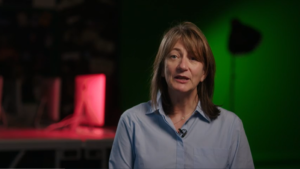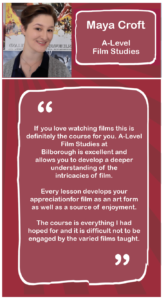Our Subject
CLICK IMAGE BELOW TO WATCH THE VIDEO

A Level Film Studies FAQs


You don’t need GCSE in either Film Studies or Media Studies to take the subject at A Level at Bilborough Sixth Form College but you will need creativity, imagination, an ability to write well and, most importantly, a real interest in and love of films.
We follow the Eduqas specification. The course is assessed through a mixture of exams and written coursework and you study a wide range of texts from early silent films to more familiar, recently released, works. The course focusses on a number of key areas including: how films are made (especially their technical construction and aesthetics), the history of film, how audiences respond to films and why they react as they do and the impact that key figures have had on the development of film.
To study Film Studies at Bilborough, you need GCSE English Language grade 5 and grade 4 in Maths GCSE. If you have taken Media Studies at GCSE we would also expect a grade 5 in that subject. However, by far the most important requirement is that you love films.
Lots of students combine this subject with A Level Media Studies or if you want a more practical option you could take the new BTEC Extended Certificate in Creative Digital Media; universities are happy to accept both qualifications with A Level Film Studies.
Our links with HE
Our students go on to a variety of university courses, including Film Studies, Media Studies, Media & Film Production, Journalism, English Literature, Drama, Modern Languages, Biology, Law and Engineering. However, many of the students go on to study film related subjects at top universities and are working in a variety of roles in film promotion, distribution and marketing, film production, animation and film journalism.

